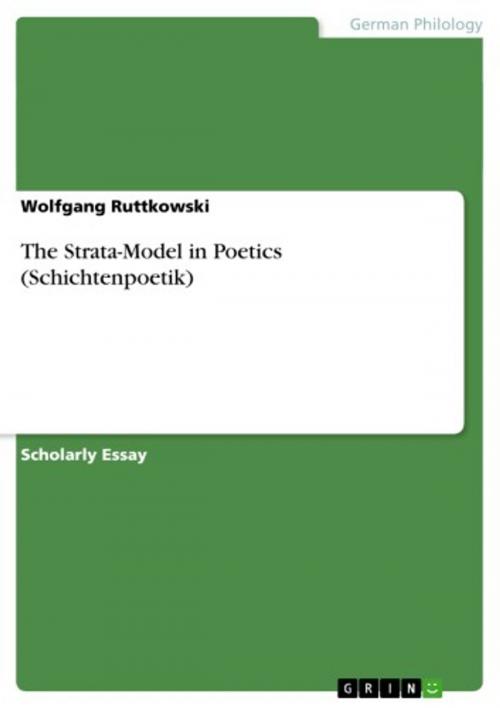The Strata-Model in Poetics (Schichtenpoetik)
Fiction & Literature, Literary Theory & Criticism, European, German| Author: | Wolfgang Ruttkowski | ISBN: | 9783638162975 |
| Publisher: | GRIN Publishing | Publication: | January 9, 2003 |
| Imprint: | GRIN Publishing | Language: | English |
| Author: | Wolfgang Ruttkowski |
| ISBN: | 9783638162975 |
| Publisher: | GRIN Publishing |
| Publication: | January 9, 2003 |
| Imprint: | GRIN Publishing |
| Language: | English |
Scientific Essay from the year 1989 in the subject German Studies - Genres, grade: none, Kyoto Sangyo University (Japanese Society for Germanistics), über Fußnoten - entries in the bibliography, language: English, abstract: Strata models are systems of categories that we project upon phenomena in order to make sense of them. They correspond to a synthetic mode of thinking, which attempts to strike a balance between the observation of universal laws and the description of individual characteristics. Like most concepts in the humanities, they do not limit, but rather serve to accentuate observed phenomena. They group together certain aspects of literature into unified strata of systems which can be said to stand in a relation to one another comparable to that of psychological strata within the human personality. The application of a strata model to the analysis of literature is mainly pragmatically motivated. The literary scholar or the interpreter of literature is less concerned with philosophical insights than with an objective comprehension of the literary work. Beyond that, s/he wishes to understand other, mainly psychological, phenomena observable within a literary context. Thus strata poetics is justified as a tool of cognition and systematization only insofar as it yields insights , which could not have been gained otherwise. The philosophical dispute as to the justification of strata models as such will be of no concern in this paper. (In: Kyoto Sangyo Daigaku Ronshuu, Humanities s. No. 30, march 2003, 1-20)
Wolfgang Victor Ruttkowski, Jahrgang 1935, war nach einem Studium der Germanistik, Geschichte, Theaterwissenschaft, Psychologie und Sprechkunde viele Jahre als Professor in Canada, den USA und Japan tätig. Seit 2003 lebt er emeritiert in Kyoto. Seine Forschungsschwerpunkte liegen in der Ästhetik, Literaturtheorie und -didaktik, Gattungspoetik, Psychologie und Kunstpsychologie. In diesen Gebieten veröffentlichte Ruttkowski zahlreiche Bücher und Essays.
Scientific Essay from the year 1989 in the subject German Studies - Genres, grade: none, Kyoto Sangyo University (Japanese Society for Germanistics), über Fußnoten - entries in the bibliography, language: English, abstract: Strata models are systems of categories that we project upon phenomena in order to make sense of them. They correspond to a synthetic mode of thinking, which attempts to strike a balance between the observation of universal laws and the description of individual characteristics. Like most concepts in the humanities, they do not limit, but rather serve to accentuate observed phenomena. They group together certain aspects of literature into unified strata of systems which can be said to stand in a relation to one another comparable to that of psychological strata within the human personality. The application of a strata model to the analysis of literature is mainly pragmatically motivated. The literary scholar or the interpreter of literature is less concerned with philosophical insights than with an objective comprehension of the literary work. Beyond that, s/he wishes to understand other, mainly psychological, phenomena observable within a literary context. Thus strata poetics is justified as a tool of cognition and systematization only insofar as it yields insights , which could not have been gained otherwise. The philosophical dispute as to the justification of strata models as such will be of no concern in this paper. (In: Kyoto Sangyo Daigaku Ronshuu, Humanities s. No. 30, march 2003, 1-20)
Wolfgang Victor Ruttkowski, Jahrgang 1935, war nach einem Studium der Germanistik, Geschichte, Theaterwissenschaft, Psychologie und Sprechkunde viele Jahre als Professor in Canada, den USA und Japan tätig. Seit 2003 lebt er emeritiert in Kyoto. Seine Forschungsschwerpunkte liegen in der Ästhetik, Literaturtheorie und -didaktik, Gattungspoetik, Psychologie und Kunstpsychologie. In diesen Gebieten veröffentlichte Ruttkowski zahlreiche Bücher und Essays.















